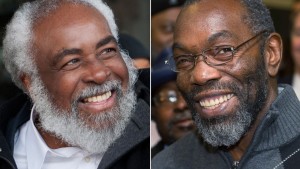In 1975, a white man was murdered on a Cleveland street corner by black robbers. Ricky Jackson, 18, and two friends, brothers Wiley and Ronnie Bridgeman, were convicted and sentenced to death. Ricky Jackson and Wiley Bridgeman ended up serving 39 years in prison; Ronnie Bridgeman was paroled in 2003.
There was no real evidence against them. They were convicted by the testimony of a 13-year-old boy who was told what to say by the police. The boy was riding in a school bus several blocks away, and didn’t see the shooting. “All the information was fed to me,” he now says. “I don’t have any knowledge about what happened at the scene of the crime. Everything was a lie.” But he did as the police told him, because they threatened to send his sick mother to prison if he didn’t cooperate.
Despite this egregious police misconduct, someone — the prosecutor, the judge, the jurors — should have seen through the lies, because the boy repeatedly changed his story, and there were numerous inconsistencies. But somehow the system convicted these youths and sent them away to rot in prison for decades, for a crime they didn’t commit.
http://www.cbsnews.com/news/exonerated-man-meets-the-liar-who-put-him-away-for-39-years/
http://www.clevescene.com/cleveland/what-the-boy-saw/Content?oid=2598138&showFullText=true
This story has many facets: Racism. Cops eager to “solve” a crime. The well-known unreliability of eyewitnesses. Coerced testimony. The credibility of child witnesses. All of these factors detract from the legal system’s ability to separate the guilty from the innocent. Here, you have a perfect storm of them. But such a deeply flawed conviction wasn’t necessarily rare or unusual; it’s more or less what you expected of Cleveland’s inner city police and courts in the 1970s.
I want to zero in on two particular issues.
Issue #1: Lying cops. Why do cops tamper with witnesses and suborn perjury? Because the police incentive system is screwed up. Detectives are paid to resolve cases, not prevent wrongful convictions. Given fallible human nature, you can’t expect people to do the right thing when they’re pressured into doing the wrong thing. This doesn’t exonerate cops who coerce witnesses and concoct false testimony; but you can’t fix this problem unless you change the incentive system. So far, most of America’s police jurisdictions haven’t done that.
Issue #2: Weaknesses of the criminal justice system. Prosecutors, judges, and jurors are supposed to act as checks and balances against overzealous police. They didn’t in this case. The entire system failed miserably. Every component of it failed, and each failure reinforced the other components’ weaknesses. Not just in this case, but many cases. Our criminal justice system can be analogized to a structurally weak airplane design. You can’t solve the problem with better pilots alone; you also need a better airplane.
We need a criminal justice system that’s effective at removing dangerous criminals from society. But it also needs to be effective at protecting innocents from police and prosecutor mistakes and wrongdoing.
Preventing wrongful convictions isn’t a simple or easy task. Smart and knowledgeable people are working on it. One of their significant conclusions is that various factors leading to wrongful convictions often are “connected and exacerbated by tunnel vision, which prevents the system from self-correcting once an error is made. In fact, tunnel vision provides a useful framework for understanding the larger system-wide failure.”
http://www.american.edu/spa/jlc/prevent/
I agree that tunnel vision is the unifying force that pulls together the legal system’s weaknesses and allows it to commit, and then refuse to correct, grievous errors. The only way to fix the problem, like fixing a too-weak wing structure, is by overcoming the legal system’s adhesion to tradition with a determined effort to improve the system using the lessons learned from experience.
We have better forensic science now; and we know most witnesses have weak powers of observation and bad memories, so why do we continue to place so much reliance on witnesses? Should anyone ever be convicted of a serious crime without corroborating physical evidence? I don’t think so.
Wiley Bridgeman, left, and Ricky Jackson, right, were released from prison on Nov. 21, 2014, after serving nearly 40 years for a murder they didn’t commit. ABC News photo.